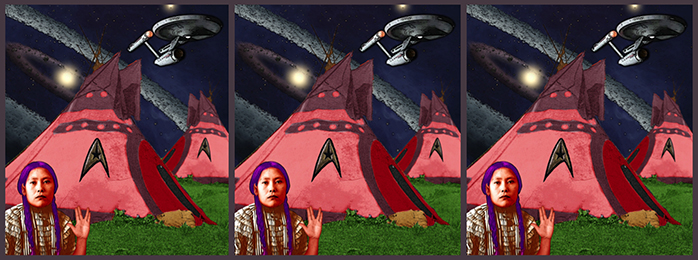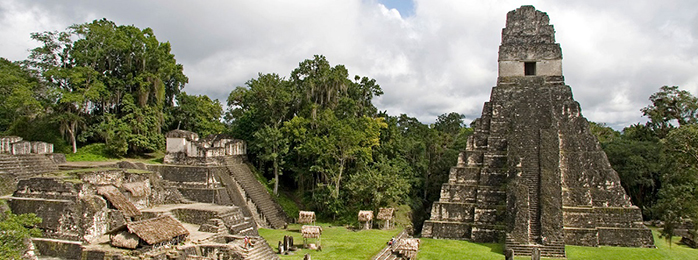2018-2019 Kaplan Scholars Courses
Fall 2018
Debra Yepa-Pappan, “Live Long and Prosper (Spock was a Half-Breed)” (multiple images)
Alternative Americas: Science Fiction and Speculative Futures
As a genre that posits a reality beyond what we currently know or experience, science fiction allows us to imagine alternate ways of being, forms of technology and knowledge, and human futures—both utopian and apocalyptic. This course will trace how and why science fiction in the Americas has emerged as a mode of narration with which to confront contemporary crises. Placing science fiction texts created by Caribbean, Native American, African American, and Latin American artists into conversation with one another, we will explore how these artists turn to stories about zombies and robots, time travel, utopias, and apocalypse (among others) to confront long histories of colonialism, slavery, and racism, and to create speculative or hypothetical futures that posit alternate futures for those histories.
To understand what is at stake in imagining alternate worlds and futures for Native, African American, Caribbean, and Latin American writers, we will examine novels, stories, films, graphic novels, video games, and other media and will draw on methodologies from literary and media studies, art history, critical race studies, and more. Questions we will consider include: How does science fiction engage the colonization of the Americas? How do science fiction genres draw on and transform contemporary science, both as a possibility of freedom and to critique a field that has been used to constrain some peoples’ freedoms? What alternative Americas do these artists envision, and how do they differ from present or historical realities? This course will include visits to NU media labs to experiment with virtual reality spaces; trips to Chicago-area theater performances, art museums, and archives; and (if funded) a visit to Indigenous mounds.
Assigned texts will include:
Eduardo Ladislao Holmberg, “Horacio Kalibang, or the Automata” (1879)
W.E.B. Dubois, “The Princess Steel” (1908)
Eduardo Urzaiz, Eugenia: A Fictional Sketch of Future Customs (1919)
Samuel R. Delany, Babel-17 (1966)
Octavia Butler, Kindred (1979)
Nalo Hopkinson, Brown Girl in the Ring (1998)
Yoss, Planet for Rent (1998)
Melissa Tantaquidgeon Zobel, selections from Oracles (2004)
Edmundo Paz Soldán, Turing’s Delirium (2006)
Pedro Cabiya, The Head (2007)
Nnedi Okorafor, Lagoon (2014)
Victor LaValle, The Ballad of Black Tom (2016)
Cherie Dimaline, The Marrow Thieves (2017)
Rebecca Roanhorse, selections from Trail of Lightning (2017)
Sofia Samatar, selections from Tender (2017)
Films
Alex Rivera, Sleep Dealer (2008)
“A Robot Walks into a Bar.” (short, 2014)
Alejandro Brugués, Juan of the Dead (2011)
Elena Palacios Ramé, Los pueblos silenciosos (The Silent Towns, 2010)
Brujos (TV-Series, 2016/17)
Field trips may include:
- A visit to the Media and Design Studio to play Never Alone (an Inuit-created video game that teaches the Inuit language and stories)
- A visit to Northwestern’s Knight Lab to demo virtual reality spaces
- A q&a session and screening with Alex Rivera, filmmaker and director of Sleep Dealer, “Cybraceros,” and “A Robot Walks into a Bar”
- A performance from Otherworld Theatre, a Chicago theatre dedicated to staging works of science fiction and fantasy
- Class session with Britt Rusert, author of Fugitive Science: Empiricism and Freedom in Early African American Culture and editor of W.E.B. DuBois’s fantasy story “The Princess Steel”
- A possible trip to one of the Indian mound sites near Chicago to explore Indigenous world building
Professors
Emily Maguire (Spanish & Portuguese) specializes in literature of the Hispanic Caribbean and its diasporas. She has taught courses on Latin American and Latina/o Literature and cultural production, Latin American science fiction, race in the Americas, and the relationship between literature and ethnographic writing. Emily is the author of Racial Experiments in Cuban Literature and Ethnography (University Press of Florida, 2011). Her current book project explores the uses of science fiction in recent Caribbean narrative.
Juan Martinez (English & Creative Writing) is a professor of creative writing and contemporary literature. He is the author of Best Worst American,a story collection. His current work explores the fantastical in the coast of Colombia. His stories have appeared inGlimmer Train, McSweeney's, Huizache, Ecotone, NPR's Selected Shorts, and elsewhere, and are forthcoming in Mississippi Review and the anthology Who Will Speak for America?
Kelly Wisecup (English & the Center for Native American and Indigenous Research) researches and writes on Native American literatures and science, especially before 1900. She has taught courses on protest and the Native American novel, colonialism and disease, race in the early Americas, and science and literature. She is the author of Medical Encounters: Knowledge and Identity in Early American Literatures (2013) and is currently working on a book about Native American interventions into evolutionary and ethnographic sciences before the twentieth century.
Winter 2019
Civilization
What is a civilization? What does it mean to be civilized? What distinguishes civilizations from one another and from other types of human societies? Are civilizations better or more advanced than other types of human societies?
In this course we will use the study of non-Western civilizations to critique traditional narratives of Western civilization as the pinnacle of human achievement. We approach our study through a wide range of disciplinary lenses such as philosophy, history, literature, religious studies, art history, archaeology, anthropology, political science, and law. From classical South Asia, to the ancient Maya, and the ancient Near East, we will compare and contrast ancient non-Western civilizations to expose an expansive understanding of what a civilization is.
Examining the ancient past of civilizations will help us locate the enduring power of the concept of civilization in the world today. Why is "civilization" so central and often debated in culture, society, and politics today?
The study of civilizations allows us to use Northwestern’s campus and Chicago as our extended classroom to discover how relics of civilization are all around us and what they mean in our world. Why is there a Roman-Egyptian mummy at Northwestern’s Garrett-Evangelical Theological Seminary? Moving beyond campus we will visit two Chicago area museums, one selected by the professors and one selected by the students, and examine how museums display civilization to us.
Readings will include excerpts from:
Gordon Childe, 1950, The Urban Revolution
Eric Cline, 2014, 1177 B.C.: The Year Civilization Collapsed
Arthur Demarest, 2004, Ancient Maya: The Rise and Fall of a Rainforest Civilization
Sigmund Freud, 1930, Civilization and its Discontents
Lewis Henry Morgan, 1877, Ancient Societies
David Wengrow, 2010, What Makes Civilization?: The Ancient Near East and the Future of the West
John Zerzan and Kevin Tucker, 2005, Against Civilization: Readings and Reflections
Professors
Ann Gunter (Art History) is an art historian and archaeologist whose research and teaching focus on the ancient Mediterranean and its neighbors in the Near East, including Mesopotamia and Iran. She is especially interested in cultural and artistic interaction between Greece and the Near East in the early first millennium BCE. She is the author of Greek Art and the Orient (Cambridge 2009) and the editor of A Companion to Ancient Near Eastern Art (Wiley-Blackwell, forthcoming). She is the Bertha and Max Dressler Professor in the Humanities.
Mark McClish (Religious Studies) specializes in classical Hinduism, with a focus on early South Asian legal and political literature (dharmaśāstra and arthaśāstra). He holds a Ph.D. from The University of Texas at Austin in Asian Cultures and Languages with a specialization in Sanskrit and Indian Religions. He is the co-author of The Arthaśāstra: Selections from the Classic Indian Work on Statecraft (Hackett, 2012) and is currently completing a manuscript examining the textual history of the Arthaśāstra. His areas of teaching include Hinduism, religion in classical India, Hindu law, and politics and religion.
Cynthia Robin (Anthropology) is an archaeologist and anthropologist. Her research focuses on the ancient Maya civilization where she has been conducting archaeological research for the past 30 years. She studies the impacts that ordinary people can have on their societies and how ancient Maya society can hold answers to understanding the nature of sustainable societies. She is the author of Everyday Life Matters: Maya Farmers at Chan, the Director of Undergraduate Studies in the Anthropology Department, and a winner of the Karl Rosengren Faculty Mentoring Award.


